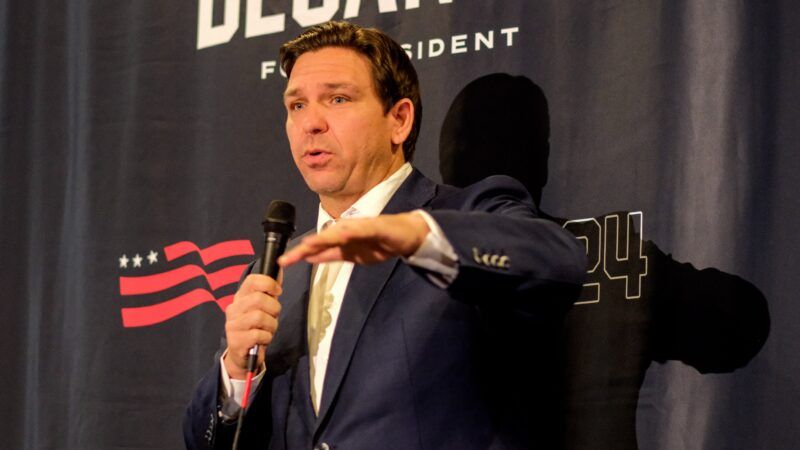DeSantis Wants To 'Eliminate the IRS' and Implement a Flat Tax
DeSantis says the new, single tax rate would mean "lower taxes for everyone" but that only demonstrates that he hasn't thought too deeply about how a flat tax would work.

During a town hall event in Iowa on Thursday night, Gov. Ron DeSantis (R–Fla.) floated the idea of abolishing the IRS and implementing a so-called "flat tax" that would charge all Americans the same rate.
"I would eliminate the IRS, have a single rate, and just do a flat tax," DeSantis said in response to a question from CNN's Kaitlan Collins, who was moderating the televised event. "That would be the ideal tax system."
If elected, Gov. DeSantis says he supports a "flat tax" — a single national income tax rate, with no deductions or exemptions — and would abolish the Internal Revenue Service. pic.twitter.com/tR5EbvkXUT
— Kaitlan Collins (@kaitlancollins) January 5, 2024
This is not the first time DeSantis has proposed these ideas. Shortly after announcing his campaign for president last spring, DeSantis told conservative radio host Dana Loesch that he viewed the IRS as "a corrupt organization" and would like to replace it with "something totally different." He's also voiced support for a flat tax in the past.
As Semafor reporter David Weigel pointed out on X (formerly Twitter), it says something about the lack of policy substance in the GOP primary that DeSantis' earlier calls for abolishing the IRS and implementing a flat tax have been a non-factor in the campaign. Vivek Ramaswamy has similarly pledged to abolish the IRS and South Carolina Gov. Nikki Haley has called for lowering individual tax rates and reducing the number of tax brackets, though she has not provided many details about the plan.
It's also telling that, months after he initially floated it, DeSantis seemingly hasn't fleshed out the details of his flat tax idea—like what he'd want the new, single tax rate to be. On Thursday, he promised that the new rate would mean "lower taxes for everybody."
That line seems to give away how little DeSantis has thought about the specifics of his tax plan. For "everyone" to enjoy lower taxes under a flat tax system, the new rate would have to be less than the lowest current marginal federal tax rate of 10 percent, which applies to the first $11,600 earned by single filers or $23,200 earned by married couples.
It would be tremendous to have a federal income tax rate of less than 10 percent, of course, but that would be a reckless move unless paired with dramatic cuts to government spending.
A more workable proposal would probably look something like a plan drafted by The Tax Foundation and modeled on the income tax system used in Estonia: a 20 percent flat tax with a limited number of deductions. That would be a tax increase for many low-income Americans but would represent a modest tax cut for most of the middle class (which currently includes the 22 percent and 24 percent tax brackets) and a larger cut for wealthier taxpayers. The way to pitch that idea to voters is not by promising that everyone will get a tax cut, which is unlikely to be true, but by highlighting the many benefits that come from a simplified, fairer tax code.
In fairness, DeSantis did gesture towards those benefits in his response to Collins. "Low rates, broad base, ultimately that's the best and most conducive to economic growth," he said.
Indeed, that same Tax Foundation reform plan estimates that switching to a flat tax could save around $100 billion annually by simplifying the tax code and eliminating compliance costs. A fairer, simpler tax code would boost economic growth, wages, and jobs.
As the governor of a state with no income tax and booming economic growth, DeSantis entered this presidential campaign with a unique opportunity to promote a different vision for the country. But DeSantis, like the Republican Party as a whole, has been derailed by a lack of serious policy chops and an eagerness to engage in culture war nonsense in an attempt to appeal to the GOP's right wing.
That clearly hasn't worked: DeSantis is trailing former President Donald Trump by more than 30 points in Iowa, a state the DeSantis campaign reportedly views as critical to claiming the nomination.
Would DeSantis be doing better if he'd spent the past few months crafting an actual proposal to overhaul the federal tax system to make it look more like Florida's or Estonia's? Maybe not, but he likely wouldn't be doing any worse.


Show Comments (233)